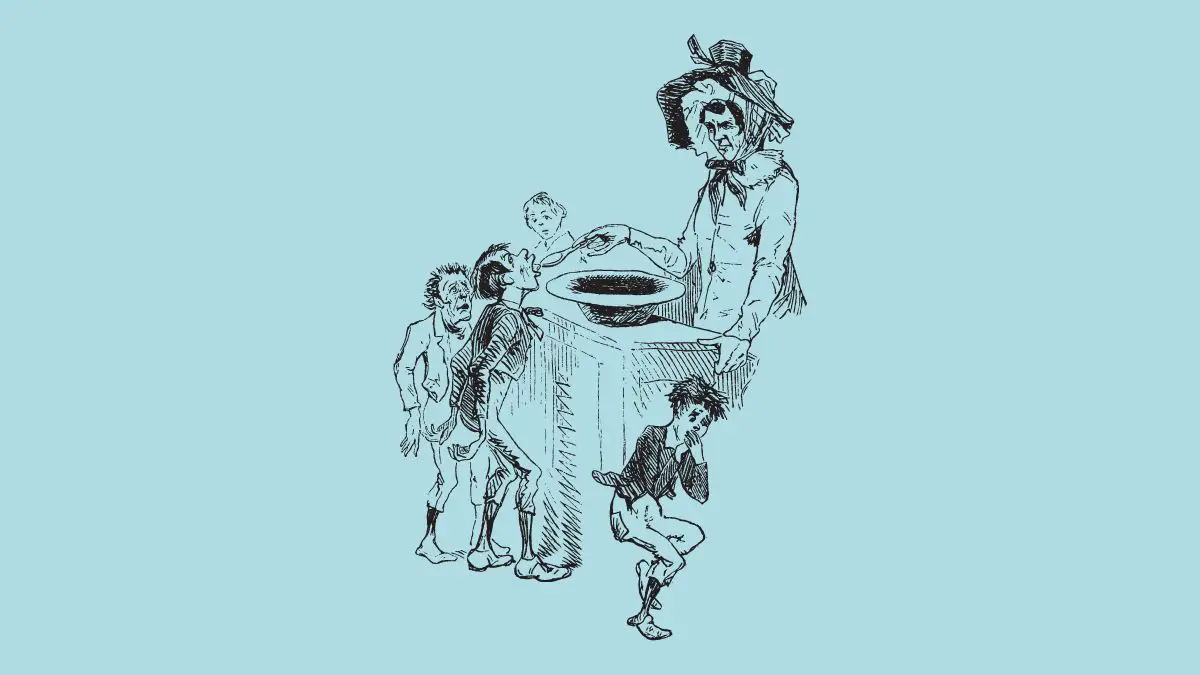Table of Contents
- Introduction
- 1. Unveiling the Social Injustices Portrayed in Oliver Twist
- 2. Moral Lessons and Character Development in Oliver Twist
- 3. Resilience and Hope: Themes of Redemption in Oliver Twist
- Conclusion
Introduction
The write-up discusses three important lessons from Oliver Twist. Charles Dickens’s classic novel has captured the hearts and minds of readers for generations. This timeless tale not only entertains but also educates, shedding light on the harsh realities of 19th-century London and the enduring lessons that resonate with readers today.
Oliver Twist holds a significant place in the canon of English literature. Published in 1837, the novel quickly gained popularity and has since become a beloved classic. Dickens’ vivid descriptions and compelling characters have left an indelible mark on the literary world, influencing countless writers and inspiring numerous adaptations across various media.
Beyond its literary merit, Oliver Twist has profoundly impacted societal perceptions. Dickens’s portrayal of the plight of orphans and the underprivileged exposed the dark underbelly of Victorian society, challenging readers to confront the injustices that plagued their world. The novel’s themes of poverty, exploitation, and the struggle for survival continue to strike a chord with readers, reminding us of the importance of compassion and social responsibility.
At the heart of Oliver Twist lies a cast of unforgettable characters. From the innocent and resilient Oliver himself to the cunning and manipulative Fagin, each character plays a crucial role in shaping the narrative. Through their experiences and interactions, Dickens explores complex themes such as the corrupting influence of power, the transformative power of kindness, and the enduring strength of the human spirit.
As we delve into the timeless lessons of Oliver Twist, we will uncover the social injustices portrayed in the novel, examine the moral dilemmas faced by its characters, and explore the themes of resilience and hope that permeate the story. By engaging with this literary masterpiece, we gain a deeper understanding of the past and valuable insights that can guide us in navigating the challenges of our lives and society.
1. Unveiling the Social Injustices Portrayed in Oliver Twist
In Oliver Twist, Charles Dickens masterfully weaves a tapestry of social commentary, exposing the harsh realities and injustices that plagued 19th-century London. Through vivid descriptions and compelling characters, Dickens sheds light on the prevalent themes of poverty, class divide, and exploitation that permeated society during this era.
One of Oliver Twist’s most striking aspects is its unflinching portrayal of the dire conditions faced by the poor and underprivileged. Dickens paints a grim picture of the workhouses, where orphans like Oliver are subjected to grueling labor, meager rations, and inhumane treatment. The novel exposes the cruelty and indifference of those in power towards the suffering of the less fortunate, highlighting the stark contrast between the lives of the wealthy and the needy.
Dickens’ vivid descriptions transport readers into the filthy streets and dark alleys of London, where poverty and crime run rampant. Through the eyes of young Oliver, we witness the desperate struggles of those forced to resort to thievery and deception merely to survive. The author’s keen observations and attention to detail bring the grim realities of the time to life, making it impossible for readers to turn a blind eye to the social injustices that plagued society.
While Oliver Twist is set in the 19th century, the themes it explores remain remarkably relevant in contemporary society. The novel is a powerful reminder that poverty, inequality, and exploitation are not confined to the past but continue to afflict communities worldwide. The class divide and the marginalization of certain groups based on their socioeconomic status persist, perpetuating cycles of hardship and injustice.
Dickens’s portrayal of the workhouses and the treatment of orphans in Oliver Twist parallels the plight of many children today in similar circumstances. The novel highlights the importance of addressing the root causes of poverty and providing support and opportunities for those in need. It serves as a call to action, urging readers to confront the social injustices in their communities and work towards creating a more equitable and compassionate society.
Moreover, the exploitation of vulnerable individuals, as depicted through characters like Nancy and Fagin’s gang of young thieves, continues to be a pressing issue in modern times. Human trafficking, child labor, and the manipulation of the disadvantaged for personal gain are stark reminders of the ongoing struggle against exploitation and the need for systemic change.
Through the pages of Oliver Twist, Charles Dickens holds up a mirror to society, forcing readers to confront the uncomfortable truths about our world. By unveiling the social injustices of his time, Dickens inspires us to reflect on our society and how we can work towards a more just and compassionate future.
2. Moral Lessons and Character Development in Oliver Twist
Oliver Twist masterfully weaves a tapestry of complex characters, each facing unique moral dilemmas. Through their struggles and triumphs, Dickens imparts valuable lessons about the human condition and the power of personal growth.
The Moral Dilemmas of Oliver, Fagin, and Nancy
At the heart of Oliver Twist lies the titular character, a young orphan whose innocence is constantly threatened by the harsh realities of the world around him. Despite facing numerous challenges, Oliver remains steadfast in his moral convictions, refusing to succumb to the temptations of a life of crime. His unwavering belief in goodness is a powerful reminder of the importance of staying true to one’s principles, even in adversity.
In contrast, the character of Fagin, the manipulative leader of a gang of young pickpockets, represents the corrupting influence of greed and self-preservation. Fagin’s moral compass is skewed by his desire for power and control, leading him to exploit vulnerable children for his gain. Through Fagin, Dickens highlights the dangers of clouding one’s moral judgment with selfish desires.
Nancy, a young woman caught between her loyalty to Fagin’s gang and her growing concern for Oliver’s well-being, faces a profound moral dilemma. Her decision to help Oliver escape, at great personal risk, demonstrates the transformative power of empathy and the courage required to stand up for what is right, even when it means defying those closest to you.
The Transformation and Growth of Characters
Throughout the novel, Dickens masterfully portrays the transformation and growth of his characters. Oliver, who begins the story as a helpless orphan, gradually develops the strength and resilience to overcome his obstacles. His journey from innocence to experience is a powerful testament to the human spirit’s ability to adapt and persevere.
Similarly, the character of Mr. Brownlow, Oliver’s benefactor, undergoes a significant transformation. Initially skeptical of Oliver’s innocence, Brownlow eventually becomes a fierce advocate for the young boy, demonstrating the importance of keeping an open mind and being willing to challenge one’s preconceptions.
The Ethical Decisions and Lessons Imparted
Throughout Oliver Twist, characters face numerous ethical decisions that have far-reaching consequences. The choices made by Oliver, Fagin, Nancy, and others serve as powerful lessons for readers, highlighting the importance of integrity, compassion, and personal responsibility.
Dickens reminds us that our actions have the power to shape not only our own lives but also the lives of those around us. By making moral choices and standing up for our beliefs, we can become agents of positive change, just like Oliver and those who fought for his well-being.
Ultimately, Oliver Twist‘s moral lessons and character development serve as a timeless reminder of the importance of staying true to our values, even in the face of adversity. Through his characters’ struggles and triumphs, Dickens encourages readers to embrace empathy, compassion, and the transformative power of personal growth.
3. Resilience and Hope: Themes of Redemption in Oliver Twist
Amid the darkness and despair that permeate much of Charles Dickens’s classic novel, glimmers of resilience and hope shine through. These themes serve as a beacon, guiding readers through the tumultuous journey of the titular character and those whose lives intertwine with his.
Throughout the novel, Oliver faces numerous hardships and setbacks, from the cruelty of the workhouse to the manipulations of the criminal underworld. Yet, despite the seemingly insurmountable obstacles in his path, Oliver remains steadfast in his belief that better days lie ahead. His unwavering spirit and determination to maintain his innate goodness in adversity are a powerful testament to the human capacity for resilience.
Dickens masterfully weaves redemption arcs into the story’s fabric, offering moments of salvation for several key characters. Perhaps the most striking example is that of Nancy, a young woman trapped in a life of crime and exploitation. Despite her circumstances, Nancy’s conscience compels her to take a stand against the evil that surrounds her, ultimately leading to her tragic demise. Her sacrifice, however, is not in vain, as it sets in motion a chain of events that brings about justice and exposes the corruption at the heart of the novel’s conflict.

The transformative power of compassion and kindness is another recurring motif in Oliver Twist. Characters like Mr. Brownlow and Rose Maylie, who take Oliver under their wing and offer him the love and support he has been denied, serve as catalysts for positive change. Their actions demonstrate that even in the darkest times, empathy can alter the course of a life and provide hope for a brighter future.
Conclusion
The profound lessons from Oliver Twist continue to resonate with readers, transcending the historical context of the novel to offer insights that are both timeless and universal. Dickens’s narrative invites us to confront the fathomless depths of poverty, the complexities of human morality, and the remarkable resilience of the spirit.
As we turn the novel’s final pages, we are left with a restored faith in humanity and a renewed sense of urgency to engage meaningfully with the world around us. The characters’ journeys through hardship and adversity remind us of the power of redemption and the significance of every individual’s choice to do good, even in the smallest of actions.
The societal critique embedded in Oliver Twist is not just a distant reflection of 19th-century London but a call to examine the persistent issues of our contemporary world. It is a prompt to action, to combat the social injustices surrounding us, and to advocate for those who, like Oliver, find themselves at the mercy of a system that often overlooks the marginalized.
The lessons from Oliver Twist extend beyond its pages and into our lives, where we must confront our moral dilemmas and decide how to respond. Will we, like Fagin, allow greed and self-interest to dictate our actions? Or will we follow the example of characters like Nancy and Mr. Brownlow, who show us that courage and kindness can bring light to the darkest places?
As we grapple with these questions, Oliver Twist stands as a mentor, a source of wisdom that is just as relevant today as when Dickens first put pen to paper. It is a benchmark for literature that entertains and challenges us to reflect, grow, and aspire to a greater sense of justice and empathy. The novel’s enduring legacy is its capacity to spark conversation, influence thought, and inspire readers to act compassionately and integrity in their quest for a better world.

1 thought on “3 Timeless Lessons from Oliver Twist”